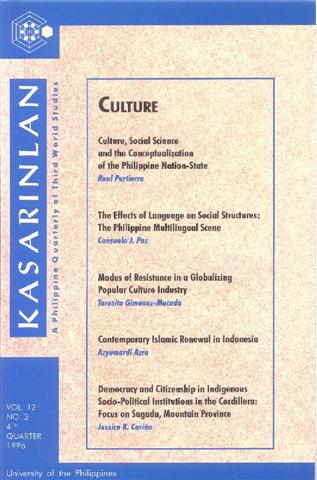Modes of Resistance in a Globalizing Popular Culture Industry
Abstract
Some contend that increasing globalization will blur the lines between nations and cultures because the world will become one global village that partakes of one culture. In the Philippines, however, instantaneous accessing of global information and cultural products remains a privilege only of an elite minority. The economic and social condition of the majority has not changed dramatically since the colonial period. It is, therefore, difficult to imagine that within a decade or two, globalization will remove national boundaries and obliterate differences between and among cultures. The Philippine experience also shows that the seemingly powerful influence on the American Popular culture and industry and the onslaught of American pop culture products have not resulted in the wholesale Americanization of Filipino pop culture products. Certainly, pop culture forms were borrowed but producers altered the formula and content to articulate their own view of the world and the Filipino self. Today, the Filipinization of television and has reclaimed for the mass audience their space and power. This process initially resulted from liberalization of, and experimentation in, the media and recently from the migration of English shows to cable TV. For the popular culture industry in the Philippines, therefore, globalization is turning out to be beneficial. The technology enables producers to reach out to Filipino communities worldwide and, at the same time, arms the regions with the means to speak. We are witnessing not uniformity but multi-cultural diversity.
How to Cite
MACEDA, Teresita Gimenez.
Modes of Resistance in a Globalizing Popular Culture Industry.
Kasarinlan: Philippine Journal of Third World Studies, [S.l.], v. 12, n. 2, july 2007.
ISSN 2012-080X.
Available at: <https://www.journals.upd.edu.ph/index.php/kasarinlan/article/view/1635>. Date accessed: 13 aug. 2025.
Section
Features
Keywords
Popular Culture, Minority, Globalization
By submitting a manuscript, the authors agree that the exclusive rights to reproduce and distribute the article have been given to the Third World Studies Center.



